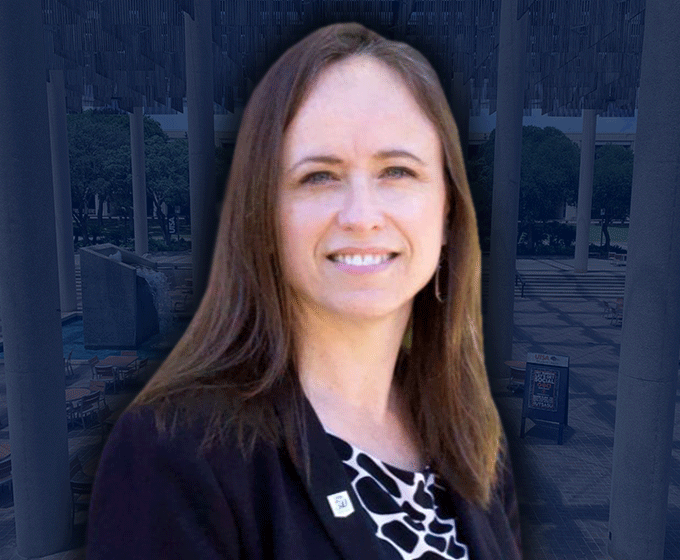
NOVEMBER 18, 2021 — Sandra Morissette, professor of psychology and chair of the Department of Psychology in UTSA’s College for Health, Community and Policy, has been elected as a fellow to the American Psychological Association (APA), Division 56 (Trauma Psychology).
This national recognition is awarded on the basis of outstanding contributions in the field of psychology that have had a national impact.
Morissette has dedicated her career to researching and understanding trauma psychology, particularly in the context of veteran support. Her research has focused on understanding factors that influence risk, resilience and functional recovery following warzone deployments.
“It is an honor and privilege to be elected to fellow status of APA’s Division 56, not only to be recognized by APA, but especially because it is a recognition from my peers who are fellows within the division and share a common passion to advance the field of trauma,” Morissette said.
Since completing her doctoral degree in clinical psychology, Morissette has conducted important research related to trauma, anxiety disorders and other commonly co-occurring conditions. She has received funding from U.S. Department of Veterans Affairs (VA), the Department of Defense and the National Institutes of Health, and has published over 100 scientific articles.
“I am personally proud of Dr. Morissette for having been named an APA Trauma Psychology Fellow as it is a quite prestigious recognition,” said Lynne Cossman, dean of the College for Health, Community and Policy. “We—as a college—are also proud to have her and her expertise on trauma psychology, particularly associated with veterans’ experiences, at UTSA and in Military City USA.”
During nearly two decades working for the VA, Morissette developed and directed the first cognitive-behavioral anxiety disorders clinic at VA Boston Healthcare System (VABHS), established a new primary care behavioral health program at VABHS, and contributed to the development of a congressionally-mandated research center for returning post-9/11 veterans in Waco, Texas.
“Notably, Texas has a vast shortage of clinical psychologists, and Waco is an area of particularly high need, neighboring Fort Hood, the third-largest military base in the world,” Morissette explained. In Waco, among other accomplishments, she established and led a 10-year, VA-funded longitudinal program of research called Project SERVE (Study Evaluating Returning Veterans’ Experiences).
Project SERVE is a network of studies designed to independently and collectively contribute to a better understanding of risk, resilience and functional recovery processes in post-9/11 veterans and their families following warzone deployments. Although Morissette left the VA in 2015, she continues to actively collaborate and lead projects related to this research at UTSA.
“I couldn’t have accomplished what I have without an outstanding team of SERVE investigators from around the country,” Morissette said. “We are particularly interested in understanding PTSD risk and resilience within the larger context of co-occurring conditions like depression, alcohol/substance use disorders, TBI, pain, sleep, suicide and non-suicidal self-injury. Our overarching aim is to develop translational clinical treatment programs using empirically-supported predictors of risk and resilience for PTSD, co-occurring conditions and functional recovery.”
Morissette received her doctoral degree in clinical psychology in 2001 from Boston University. Her work has contributed in part to a shift in the field to considering complex co-occurring conditions, particularly anxiety/traumatic stress disorders and addictive behaviors. Moreover, her research has contributed to increased attention on understanding long-term functional recovery processes among returning veterans.
“This work is far from done,” Morissette said. “Although most veterans are resilient and will never develop mental health conditions, risk for PTSD is elevated in the context of their higher trauma exposure. We must continue to build a workforce of researchers and clinicians to more fully understand and treat the complexities of PTSD and co-occurring conditions, and promote functional recovery.”
In order to be selected as a fellow for the APA, candidates must show unusual and outstanding contribution or performance in their field and demonstrate national impact. Morissette certainly fits the bill.
“I am passionate about conducting research that can help us better understand how to help veterans and improve VA healthcare,” Morissette said. “To me, it is a way to give back, to serve them for all they have done in service to our country.”
UTSA Today is produced by University Communications and Marketing, the official news source of The University of Texas at San Antonio. Send your feedback to news@utsa.edu. Keep up-to-date on UTSA news by visiting UTSA Today. Connect with UTSA online at Facebook, Twitter, Youtube and Instagram.
Move In To COLFA is strongly recommended for new students in COLFA. It gives you the chance to learn about the Student Success Center, campus resources and meet new friends!
Academic Classroom: Lecture Hall (MH 2.01.10,) McKinney Humanities BldgWe invite you to join us for Birds Up! Downtown, an exciting welcome back event designed to connect students with the different departments at the Downtown Campus. Students will have the opportunity to learn about some of the departments on campus, gain access to different resources, and collect some giveaways!
Bill Miller PlazaCome and celebrate this year's homecoming at the Downtown Campus with food, games, giveaways, music, and more. We look forward to seeing your Roadrunner Spirit!
Bill Miller PlazaThe University of Texas at San Antonio is dedicated to the advancement of knowledge through research and discovery, teaching and learning, community engagement and public service. As an institution of access and excellence, UTSA embraces multicultural traditions and serves as a center for intellectual and creative resources as well as a catalyst for socioeconomic development and the commercialization of intellectual property - for Texas, the nation and the world.
To be a premier public research university, providing access to educational excellence and preparing citizen leaders for the global environment.
We encourage an environment of dialogue and discovery, where integrity, excellence, respect, collaboration and innovation are fostered.